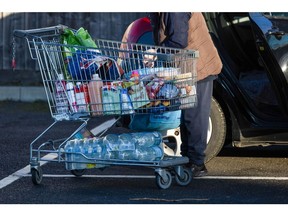Article content
(Bloomberg) — UK retail sales grew more strongly than expected at the start of the year, as otherwise cautious consumers spent more on food to eat at home.

UK retail sales grew more strongly than expected at the start of the year, as otherwise cautious consumers spent more on food to eat at home.

(Bloomberg) — UK retail sales grew more strongly than expected at the start of the year, as otherwise cautious consumers spent more on food to eat at home.
Article content
Article content
The volume of goods sold online and in stores increased 1.7% in January, partly erasing a revised 0.6% loss recorded during the festive season in December, the Office for National Statistics said on Friday. The increase last month was the largest since May. Economists had been expecting a 0.5% gain.
Advertisement 2
This advertisement has not loaded yet, but your article continues below.
THIS CONTENT IS RESERVED FOR SUBSCRIBERS ONLY
Subscribe now to read the latest news in your city and across Canada.
SUBSCRIBE TO UNLOCK MORE ARTICLES
Subscribe now to read the latest news in your city and across Canada.
REGISTER / SIGN IN TO UNLOCK MORE ARTICLES
Create an account or sign in to continue with your reading experience.
THIS ARTICLE IS FREE TO READ REGISTER TO UNLOCK.
Create an account or sign in to continue with your reading experience.
or
Article content
The data showed that food sales were the strongest since the start of the pandemic in March 2020, pushing up the overall figure despite decreases in other categories. Specialist stores like butchers and bakers, as well as supermarkets and alcohol and tobacco shops, all reported strong activity thanks to more people eating at home in January.
While the headline figure may help the Labour government counter an overall narrative of economic stagnation, sector-by-sector data suggests consumers remain cautious as they brace for more shocks. Chancellor of the Exchequer Rachel Reeves has been promising to kick start growth after her first budget in October imposed payroll taxes that prompted warnings from top employers that they could be forced to cut jobs.
“The largest monthly rise in UK retail sales since May 2024 comes after a weak performance during the critical festive period,” Bloomberg economist Niraj Shah said in a note. “While that adds to evidence the economy has stabilized, consumers are set to remain cautious about their spending ahead.”
Traders modestly pared expectations of interest-rate cuts from the Bank of England through this year, pricing just under 50 basis points in total, two basis points less than Thursday. The pound was little-changed at 1.2676 against the dollar.
Top Stories
Get the latest headlines, breaking news and columns.
By signing up you consent to receive the above newsletter from Postmedia Network Inc.
Thanks for signing up!
A welcome email is on its way. If you don’t see it, please check your junk folder.
The next issue of Top Stories will soon be in your inbox.
We encountered an issue signing you up. Please try again
Article content
Advertisement 3
This advertisement has not loaded yet, but your article continues below.
Article content
The UK narrowly skirted the threat of a technical recession thanks to a surprise increase in output at the end of 2024. But the retail sales data show that Prime Minister Keir Starmer’s Labour government is not out of the woods yet.
Households are facing renewed cost-of-living pressures from increasing food and energy bills, as well as the prospect of a trade war amid rising tariff threats from US President Donald Trump.
“Clothing shops and household goods stores had less of a successful month with retailers reporting lackluster sales due to weak consumer confidence,” ONS Senior Statistician Hannah Finselbach said.
Retail sales have declined 0.6% across a three-month period and remain below pre-Covid levels, the ONS figures also showed.
While Reeves has announced a wide range of long-term growth measures, economists warn it will take years before those have an impact on output. This means that any hopes of more immediate demand boosts are pinned on consumers.
Despite improving personal finances, households are more gloomy about the economy than they were in February last year when the UK was emerging from a recession, according to separate consumer confidence figures released by GfK earlier on Friday. Another survey from the British Retail Consortium showed that January retail sales growth doubled from last year’s levels, mainly thanks to discounts on furniture and home accessories.
Advertisement 4
This advertisement has not loaded yet, but your article continues below.
Article content
Weak consumer confidence is also becoming a growing risk for the UK’s largest retailers. Shops are warning they’ll have to increase prices to cope with Labour’s hike in employment taxes as well as the third large increase in the minimum wage.
Primark-owner Associated British Foods Plc said it expected weaker sales this year due to bleak sentiment, while fashion and homewares retailer Next also said it expects a of a slowdown in sales. Overall, retail shares have underperformed the FTSE 350 Index, falling over 11% compared to a 4.8% gain since Labour’s budget.
—With assistance from Alice Gledhill, Harumi Ichikura, Mark Evans and Joel Rinneby.
Article content
Share this article in your social network